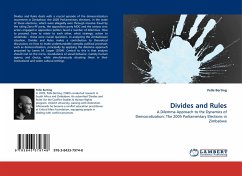
A Stitch in Time Saves Nine
The chance for successful preventive diplomacy in Zimbabwe
Versandkostenfrei!
Versandfertig in 6-10 Tagen
32,99 €
inkl. MwSt.

PAYBACK Punkte
16 °P sammeln!
This book contributes to answering the question whether or not there is a chance to successfully prevent the eruption of violent conflict in Zimbabwe by taking preventive diplomatic action. In order to do so, it first defines the concept of preventive diplomacy and discusses its viability and strategic value. Next, it develops a theoretical model outlining and weighing situational conditions perceived to be either essential for, or contributing to, successful preventive diplomatic intervention in interstate disputes. After having analyzed the political situation in Zimbabwe, the thesis comes t...
This book contributes to answering the question whether or not there is a chance to successfully prevent the eruption of violent conflict in Zimbabwe by taking preventive diplomatic action. In order to do so, it first defines the concept of preventive diplomacy and discusses its viability and strategic value. Next, it develops a theoretical model outlining and weighing situational conditions perceived to be either essential for, or contributing to, successful preventive diplomatic intervention in interstate disputes. After having analyzed the political situation in Zimbabwe, the thesis comes to the conclusion that the chance for successful preventive diplomatic intervention is slim at best. Despite clear international willingness to engage in and support preventive diplomatic efforts, combined with ample availability of sufficient financial means and information, Mugabe´s corrupt patronage systems and other domestic pressures to preserve the current situation still manage to diminish virtually any chance to prevent the situation from worsening in Zimbabwe.












